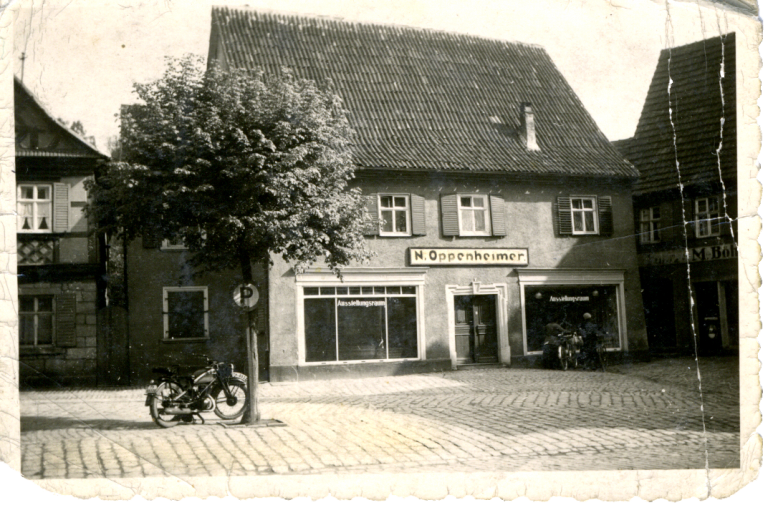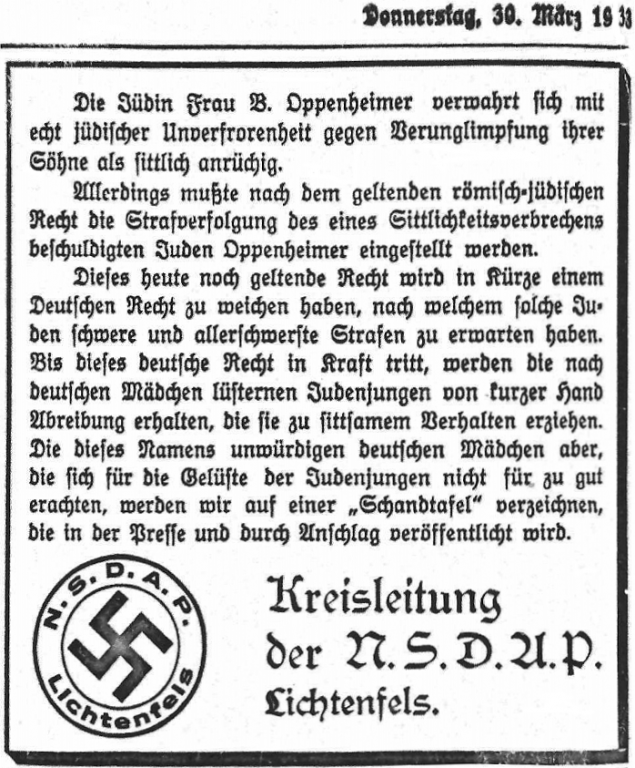Betty Oppenheimer
Verfasser: Luise Aumüller, Luise Birkner

Businesswoman in Lichtenfels
 Jewish Museum of Maryland
Jewish Museum of MarylandBetty Malzer (1877-1942), daughter of Franziska Stern and Philipp Malzer of Sulzfeld (near Bad Königshofen im Grabfeld), married Nathan Oppenheimer in 1901, a merchant who ran a textile business in Königshofen. In 1904, they took over Betty's grandparents' textile business at Unteres Tor in Lichtenfels and moved here with their three children. After Nathan's early death in 1920, their son Alfred took over the business, but many sources show that Betty continued to be intensively involved.
 Jewish Museum of Maryland
Jewish Museum of Maryland
In conflict with the Nazi party

Betty Oppenheimer must have been a courageous woman. In 1933, when the Lichtenfels NSDAP agitated against one of her sons, (who probably had a relationship with a non-Jewish girl from Lichtenfels), Betty publicly confronted the NSDAP district management (“Kreisleitung”). The latter, however, blatantly and publicly swore violent revenge. Whether the early emigration of her son Max had anything to do with this affair, we cannot say for sure.
In 1938, Betty wrote a letter to the political police to get her son Alfred out of "protective custody". Here, too, she showed courage by contacting influential relatives in the U.S. (e.g., the governor of New York, Herbert Lehmann), a nephew of the Lehman Brothers for their help.
Advertisement of the NSDAP district management against the Oppenheimer family in the Lichtenfelser Tagblatt 30th of March1933, translation: The Jewess Mrs. B. Oppenheimer, with genuine Jewish impudence, protests against her sons being insulted as morally indecent. District leadership of the N.S.D.A.P. Lichtenfels. |
A fatal mistake
In 1938, the family sold their possessions, gathered all their important documents for their departure and began packing their belongings. It is worth noting, that during this time, it was strictly forbidden for Jews to export any valuables. Nevertheless, Alfred tried to take some furs and jewelry (which he owned) by hiding the items in furniture which they were taking with them. Unfortunately, they were unsuccessful, and Betty was sentenced to one year in prison, Alfred and his wife to two years. After that, it was no longer possible to leave the country, Betty had to move into the Judenhaus in Lichtenfels and was taken to eastern Poland (Krasnystaw, Kraśniczyn Ghetto) on the DA49 deportation train in April 1942. She was murdered, probably in Sobibór on June 6, 1942.
